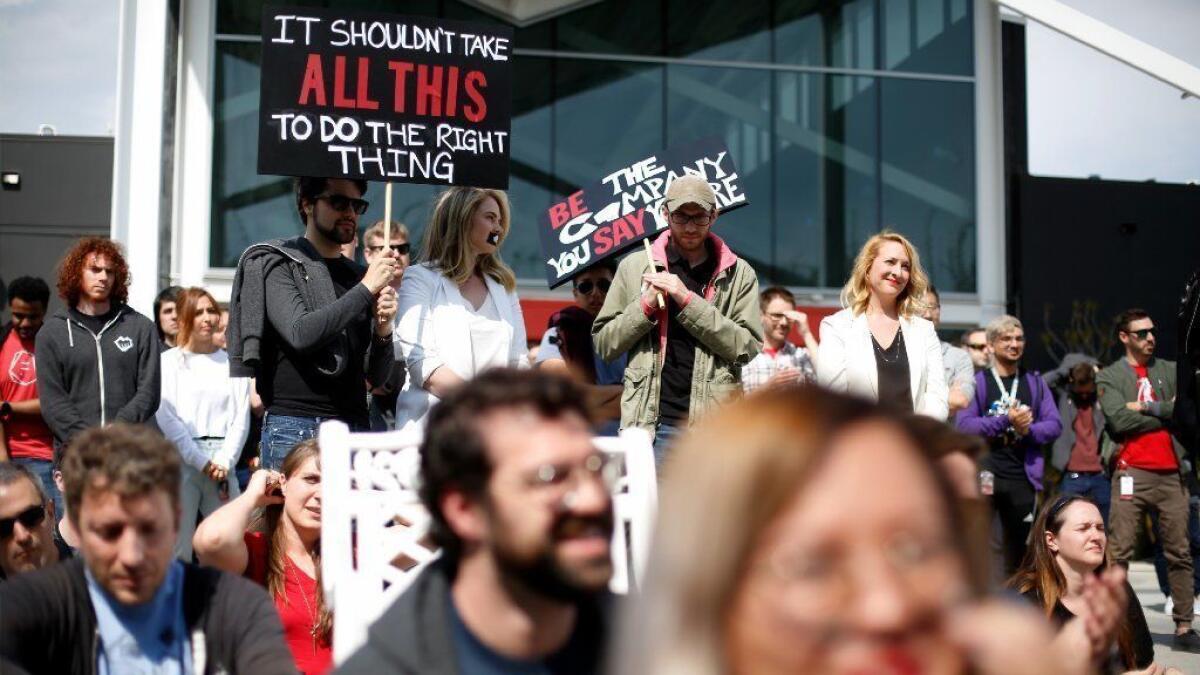California reveals it’s investigating gender-discrimination claims at Riot Games

The scrutiny of Riot Games Inc. over allegations of gender discrimination and sexual harassment at the “League of Legends” video-game maker grew wider Wednesday: California regulators revealed they’re investigating the matter as well.
The state Department of Fair Employment and Housing, the agency that enforces California’s civil-rights laws, said it filed a court action demanding that the Los Angeles company provide it with employee pay data.
The action, filed Wednesday in Los Angeles County Superior Court, was necessary because Riot Games “has refused to provide the department with adequate information” for the agency “to analyze whether women are paid less than men at the company,” the department said.
It also said it wants the information “as part of an investigation into alleged unequal pay, sexual harassment, sexual assault, retaliation and gender discrimination in selection and promotion” at the company.
Riot Games expressed disappointment about the court action, saying it has been “cooperating in good faith with the department to address its concerns” since the investigation began in late October.
“During this time, we’ve promptly responded to the DFEH’s requests and have produced over 2,500 pages of documents and several thousand lines of pay data so far,” Riot Games said in an emailed statement. “We’ve also made several recent requests that the DFEH participate in a call with us to address their requests,” it said, but “these requests have been unanswered.”
Similar accusations by current and former employees have embroiled Riot Games in recent months. More than 200 workers walked out of Riot’s headquarters last month to protest what they described as a culture of sexism at the company and its handling of sexual-discrimination lawsuits.
The Department of Fair Employment and Housing “has broad authority to investigate potential violations of California’s civil rights laws similar to grand jury proceedings,” department Director Kevin Kish said in a statement.
“When companies fail to cooperate voluntarily with our investigations, including with our investigative discovery, [the department] will exercise its right to seek assistance from the courts,” he said.
A division of the Chinese internet giant Tencent Holdings Ltd., Riot Games was founded in 2006 and has become a major player in gaming and esports, with 2,500 employees — whom it calls “Rioters” — and $2.1 billion in revenue in 2017.
After The Times and other media outlets last year pointed to a culture of sexism and harassment against women at the company, Riot Games said it would change its culture with the help of consultants, restructured its human-resources systems and changed the composition of its board.
Riot Games also has said it has a “zero-tolerance policy on discrimination, harassment, retaliation, bullying and general toxicity.”
But in the following months, five current and former employees filed lawsuits against Riot Games, alleging violations of the California Equal Pay Act as well as gender-based discrimination, retaliation and harassment.
The company in April filed motions to move two of the suits into arbitration, rather than a trial. It said the plaintiffs had signed arbitration clauses when they were hired, a move that further angered the employees and helped lead to the protest last month.
The week after the protest, Riot Games said that it would still require employees to go through arbitration, but that it did not rule out allowing alternatives to arbitration in the future after the current litigation is concluded.
“We are working diligently to resolve all ongoing litigation, so that we can quickly take steps toward a solution that more Rioters feel good about,” the company said in a blog post May 3.
Twitter: @PeltzLATimes
More to Read
Inside the business of entertainment
The Wide Shot brings you news, analysis and insights on everything from streaming wars to production — and what it all means for the future.
You may occasionally receive promotional content from the Los Angeles Times.











